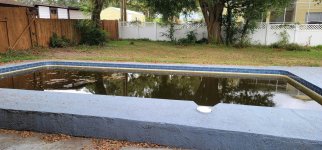Hello everyone, I'm looking for recommendations on how to proceed.
I closed on my house at the end of 2019, even hired a pool inspector that gave the OK after having the seller install a pool light. This is my first inground pool, so I went into it extremely blind. The local pool guys that service the area were intimately familiar with my house & pool because they used to service it (and hated it due to the lack of a birdcage/enclosure + live oaks overhead). They shared pictures of how the pool used to look before I bought the house and it was crumbling in on itself (pool wall on one side collapsed). They're also the ones that sold the previous owners the current pump & filter, knowing they were too small for the pool. I did my best to keep the water clear & swimmable until this year.

I closed on my house at the end of 2019, even hired a pool inspector that gave the OK after having the seller install a pool light. This is my first inground pool, so I went into it extremely blind. The local pool guys that service the area were intimately familiar with my house & pool because they used to service it (and hated it due to the lack of a birdcage/enclosure + live oaks overhead). They shared pictures of how the pool used to look before I bought the house and it was crumbling in on itself (pool wall on one side collapsed). They're also the ones that sold the previous owners the current pump & filter, knowing they were too small for the pool. I did my best to keep the water clear & swimmable until this year.
- House & pool built in 1972, Central FL, plumbing has not been updated besides new pump & fittings.
- Pool was crumbling in on itself prior to previous owners renovations, renovations were only cosmetic (did not know this until later)
- Skimmer has never worked, only main drain, PVC under deck likely cracked in several areas, pool loses water quickly
- Pump & filter too small for the size of the pool
- Had to unfortunately 'let the pool go' and turn green during a brief stint of unemployment this year, it remains green.
- Called several local companies, they don't want to perform a green clean (either too busy or too much work, which I understand)
- Pool company that covers pools says a safety cover is a 'no-go' because they can't drill into the deck




